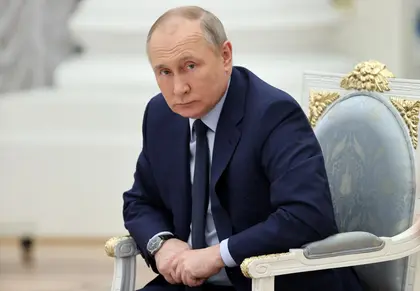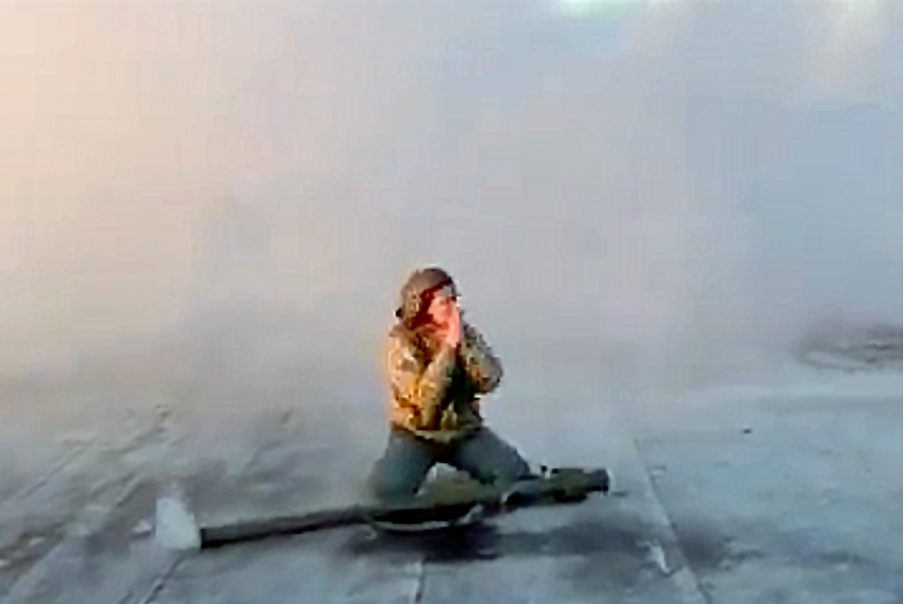In April 2021, a couple of former top Ukrainian officials told me that Russia would attack. In July 2021, Putin published his long article, “On the Historical Unity of Russians and Ukrainians,” which denied the existence of the Ukrainian nation – his public position since 2008. It was an evident declaration of war. The United States, the UK and Canada got his message, while Germany and France as usual understood nothing. The United States, the UK, Canada, the Baltic states and Poland started delivering a lot of serious arms to Ukraine.
Yet, in April 2021, the United States gave a dubious signal to Russia. Two US destroyers were on their way into the Black Sea, but they received orders not to proceed from the White House. The United States signaled that it had given up on the freedom of navigation in the Black Sea, effectively reneging on the 1936 Montreux Convention. In June 2021, British and Dutch naval ships entered the Black Sea but were illegitimately attacked by the Russian navy, while the United States remained passive.
JOIN US ON TELEGRAM
Follow our coverage of the war on the @Kyivpost_official.
After Russia attacked Ukraine on Feb. 24, 2022, we were a large group of people here in Washington who called for a US-supported no-fly zone over part or the whole of Ukraine, as the United States had done in Iraq, but once again the administration did nothing, seemingly deterred by Russian threats.
When Russia launched the full-scale war against Ukraine, the collective West did many good things. First of all, it got together, and it also included countries such as Japan and South Korea. Second, it started delivering all kinds of serious warnings. Third, it imposed severe sanctions, notably on Russian central bank reserves and Western technology.

ISW Russian Offensive Campaign Assessment, November, 19, 2024
The West’s strategy deficit
Unfortunately, the West failed to declare a clear strategy or goal for what it was doing and that remains the case. The United States and Germany are the dominant arms suppliers, but they have failed to clarify what they are up to. All along, the United States has refused to deliver the most relevant arms it has at hand for no apparent reason other than somebody in the White House was worryied about provoking Putin, a nuclear war, or World War III, apparently unaware that the most provocative action is to hold back in fear of Russia. The West (the United States) has failed to deliver air force and long-distance missiles in time, and it has absurdly prohibited Ukraine from attacking its aggressor’s bases in Russia.
Russia has habitually threatened nuclear war for all kinds of minor infractions, so Kremlin threats should not be taken seriously.
Today, Russia’s war against Ukraine has lasted for more than two years. Russia will not give up until it is beaten. So we had better make sure that it gets beaten. Russia has habitually threatened nuclear war for all kinds of minor infractions, so Kremlin threats should not be taken seriously. The United States has the best arms, but will pro-Putin Trump come back? The United States has to do all it can before such a calamity happens. Therefore, the United States now should deliver all the key arms to Ukraine as fast as possible, notably long-distance missiles. The United States needs to make clear that Ukraine is fully entitled to attack all the bases of its aggressor.
The collective West needs to rethink its Ukraine and Russian policy and adopt a strategy. First of all, the collective West must establish the goal: Ukraine’s victory and recovery of all its territory from 2013. It must defeat Russia, which should be forced to pay war reparations to compensate Ukraine. Only in material terms, the World Bank assesses these costs at about $500 billion. The hundreds of thousands of Ukrainians who have been deported to Russia must be allowed to return. The tens of thousands of war crimes committed by Russian troops should be prosecuted and punished. The United States and some other Western countries must no longer hold Ukraine back from attacks on Russian strategic and military assets but instead welcome them.
The best that can happen to Russia is defeat. When Russia has been defeated in a war, it has usually reformed and often changed ruler, as after the Crimean War (1853-56), the Russo-Japanese War (1904-05), and the war in Afghanistan (1979-88). Putin is today’s Hitler, and he has reversed Russian repression back to Stalinist times. No Russian leader could possibly be worse than Putin. He appears to have opted for eternal war, which is likely to end with his demise. We should welcome regime change in Russia, though it is up to the Russians to accomplish it. Sensible Russian liberals, such as Leonid Gozman and Viktor Shenderovich, call for a Russian capitulation commensurate with Germany’s capitulation in May 1945.
Many believe that Russia will benefit from a long war because it has a larger population and economy than Ukraine, but the United States was defeated in Vietnam and Afghanistan after long wars. Still, a long war will cost everybody far more. The West should return to Colin Powell’s successful Gulf War doctrine of using decisive force with all available resources to achieve Ukraine’s victory over Russia.
Ukraine defends Europe. Therefore, the West should stop drip-feeding Ukraine with old weapons and instead deliver all its most relevant arms as soon as possible so that Ukraine can save its population and win. Nobody can use them better than the skillful Ukrainian soldiers. If Ukraine were to lose, the Russian hordes would march further in Europe. The least we can do is to give Ukraine all it needs to win. Denmark and the Baltic states have set splendid examples.
Specifically, the West should deliver potent long-distance missiles, such as ATACMS and Taurus, and it should provide Ukraine with a strong air force so that it can gain air supremacy. Absurdly, the West has turned Russian airspace into a no-fly zone for Ukraine, rather than the other way around. Instead, it should provide Ukraine with proper air defense. Thousands of Western volunteers fight for Ukraine. Why not Western pilots as well?
The eminent retired US Generals Ben Hodges and Philip Breedlove have long explained that Crimea is likely to be decisive for the outcome of the war. In the middle of the 19th century, tsarist Admiral Pavel Nakhimov stated that who controls Sevastopol controls the Black Sea. A key strategic goal is that Ukraine and not Russia controls Sevastopol. To cut off Crimea from Russia, Ukraine needs to destroy the two bridges to Crimea.
Paying Ukraine back for damage
To force Russia to pay war reparations to Ukraine, the West should confiscate the $300 billion of Russian Central Bank reserves frozen in the West. Canada and the United States have adopted such laws. They should implement them, and the EU should follow. It is unconscionable that Russia, while violating all international laws, can have its state property shielded in the West or that Belgium indulges in war profiteering by taxing frozen Russian state assets to its own benefit.
As long as the intensive war continues, the West also needs to provide Ukraine with $100 billion a year – $50 billion at least in military assistance, $40 billion to finance the civilian government and $10 billion in humanitarian assistance.
The main event of the upcoming NATO summit should be to invite Ukraine to become a member.
Western sanctions bite, but they have to be strengthened. Thanks to Western financial sanctions, the Russian economy has not grown since 2014. Last year Russia’s export revenues fell by 26 percent. The best way to reinforce Western trade sanctions would be if the West imposed prohibitive import tariffs on all imports from Russia, as the EU is now doing on Russia’s agricultural exports. The West no longer applies the Most Favored Nation tariffs to Russia, and the allowed WTO bounded tariffs are very high. Since the West trades so little with Russia higher tariffs will no longer have any significant impact on inflation in the West. The customs system functions well so enforcement problems would be minimized.
During the Cold War, the collective West cooperated in their Coordinating Committee for Multilateral Export Controls (CoCom), headquartered in Paris. It should be restored to render control of sensitive exports to Russia more effective.
Personal sanctions need to be coordinated, reinforced and streamlined as well. All sanctioning jurisdictions should agree on similar rules for sanctions, impose the same sanctions, and exchange classified information about the reasons. Meanwhile, those who condemn the war and withdraw from Russia should be delisted in all jurisdictions. Secret ownership in the West by sanctioned oligarchs should no longer be tolerated.
The West needs to start thinking about how to penalize Western companies that continue to work in Russia and support the Russian government with taxes and other benefits to its warfare. A reasonable idea would be that they be forced to pay penal taxes commensurate to what they pay to Russia.
The EU needs to start negotiations with Ukraine about its accession to the Union. On July 9-11, NATO will celebrate its 75th anniversary with a summit in Washington. The main event should be to invite Ukraine to become a member, which a big majority of the NATO members supported already last year in Vilnius.
Anders Åslund is an adjunct professor at Georgetown University. His most recent book was Russia’s Crony Capitalism: The Path from Market Economy to Kleptocracy.
This article is reprinted with the author’s permission from The Jerusalem Strategic Tribune. See the original here.
You can also highlight the text and press Ctrl + Enter






